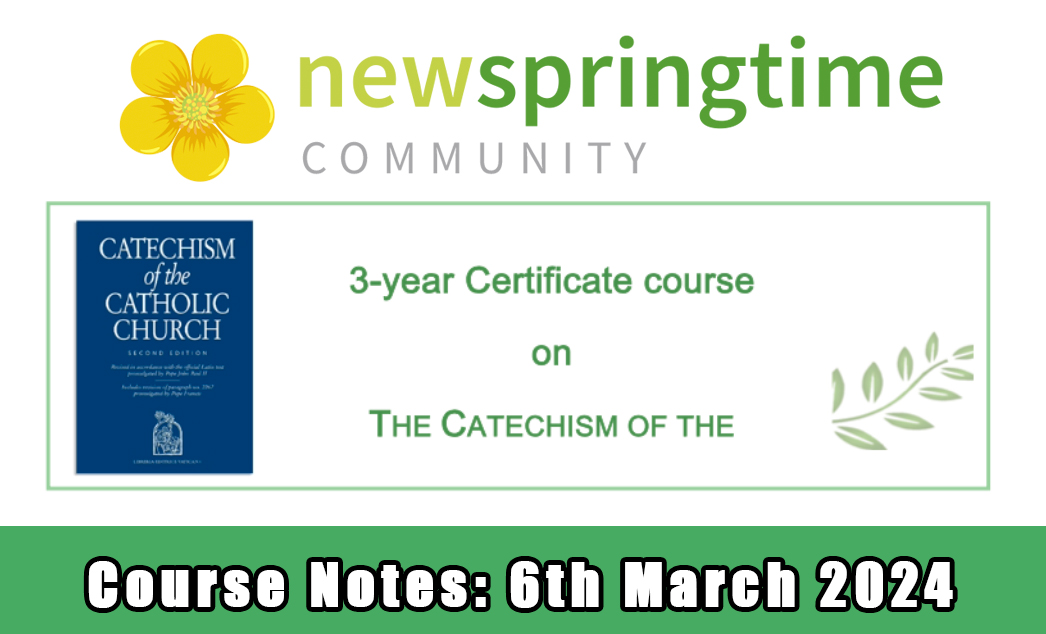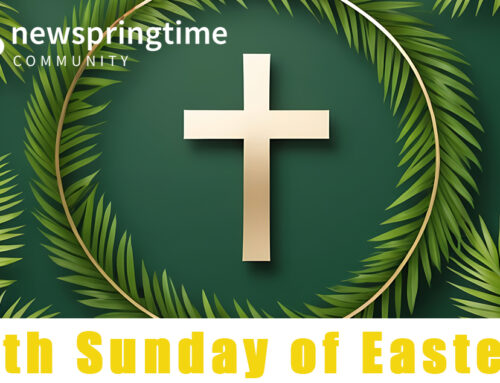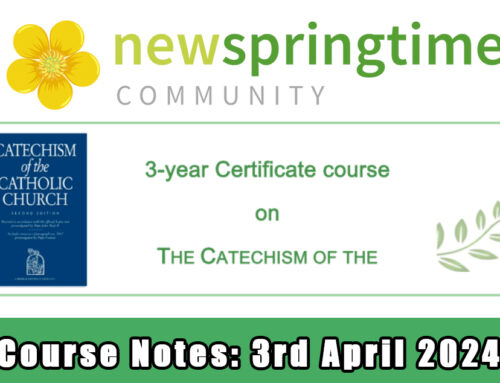The Catechism of the Catholic Church – 6th March 2024
To download The Catechism of the Catholic Church course notes for 6th March 2024, please click here
Commentary no 20.
I can remember the very first sermon I preached after my ordination. It was about the fact that the Church is holy. The Archbishop of Dublin had directed that priests were to preach about the fact that the Church is one, holy, Catholic and apostolic, on successive Sundays. I can recall how I had to reconcile the fact that the Church is essentially holy while its members are often unholy as a result of serious sin. How could we have unholy holiness? While I cannot remember what I said in my first sermon, I was reminded of an Irish folk tale which recounts how a man had a disagreement with his local priest and resolved not to go to Mass in the future. One Sunday he met a stranger who asked him to walk with him. He led him to a stream. The man drank water from the stream and pronounced it to be the purest water he had ever tasted. The stranger walked with him to the source of the stream and found that it sprang from the mouth of a dead dog. The stranger then explained that the Holy Mass could benefit him even though the priest was unholy. This is so because the Church believes in the principle of ex opere operato, i.e., that the sacraments convey the graces they signify no matter how sinful the priest is who administers them.
We are all called to be holy. The Dogmatic Constitution on the Church, speaks with clarity about this universal call, saying that no one is excluded: “The forms and tasks of life are many but holiness is one — that sanctity which is cultivated by all who act under God’s Spirit and… follow Christ, poor, humble and cross-bearing, that they may deserve to be partakers of his glory” (Lumen Gentium, par 41). The Council said that the second universal calling was that to evangelisation. The two calls are interrelated. One cannot be truly holy without evangelising; one cannot evangelise effectively without being holy.
Many years ago, I was asked to drive Cardinal Mc Cann of Capetown in South Africa to visit Cardinal Thomas O’ Fee in Armagh, Northern Ireland. On the way back I asked, the prelate if he had attended the Second Vatican Council. He told me, in no uncertain terms, that indeed he had. Then I asked him what had impressed him most about the council. Without hesitation, he replied, “Fr. Collins the thing that impressed me most about the Council was the universal call to holiness. It is addressed not only to priests and religious, but also to the laity in virtue of their baptismal incorporation into Christ.”
Sometime the Lord spoke these words to my heart when preparing a homily while living in Detroit. “I want you to be holy, I want you to turn away from the ways of the world. I call on you to root out your sins, great and small alike. Be assured that I will not only enlighten your heart to know your sins I will enable you to turn away from them by a great and liberating outpouring of my grace. Be holy as I am holy. There is no substitute for this holiness. There is no plan, effort, or activity, no matter how well intentioned, which will accomplish my purposes if you are not holy like Me. When your heart is cleansed, my Spirit will pray ardently within you, it will guide you in ways you have not known, it will empower and protect you from the deceptions of the evil one. It will fill you with my joy.”
The Catechism also talks about the relationship of the Catholic Church to the Jewish people.
Firstly, it points out, “The Jewish faith, unlike other non-Christian religions, is already a response to the revelation of God in the Old Covenant.”
Secondly, Pope Benedict XVI said in vol. 2 of Jesus of Nazareth that the as a people cannot be blamed for the death of Jesus.
Thirdly, Pope Benedict XVI also said that it is better for Christians to engage in dialogue with Jews, rather than direct evangelisation. That said, Catholics should witness to their faith in Jesus.
Fourthly, St Paul said in Rm 11:25 “God did not reject his people, whom he foreknew.” Paul went on to say, “I do not want you to be ignorant of this mystery, brothers, so that you may not be conceited: Israel has experienced a hardening in part until the full number of the Gentiles has come in, and in this way all Israel will be saved.”
Some scripture scholars say that the passage predicts a large-scale conversion of Jewish people at the end of this age through faith in the gospel of Jesus their Messiah. Since the 1970s hundreds of thousands of Jews have become believers in Jesus as the promised Messiah. Those who have become Catholics are referred to as Hebrew Catholics. One o them, Roy Shoeman, author of Honey From the Rock: Sixteen Jews Find the Sweetness of Christ says that rather than being a convert to Catholicism he is Jew who has found the fulfilment of his Jewishness in the Catholic Church. Surely, these developments are of eschatological significance.





